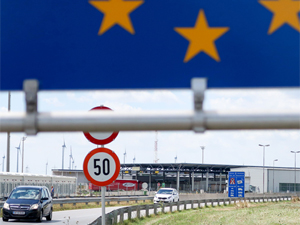



Date:02/11/18
 Lie detectors equipped with artificial intelligence are set to be tested at border points in Europe as part of an EU-funded project to combat crime and terrorism.
Lie detectors equipped with artificial intelligence are set to be tested at border points in Europe as part of an EU-funded project to combat crime and terrorism.
Travellers will be asked to upload pictures of their passport, visa and proof of funds, and will then use a webcam to answer questions such as "what is in your suitcase" from a computer-animated border guard.
The €4.5m project, called iBorderCtrl, will be tested at the borders of Hungary, Latvia and Greece for six months. The aim of the project is to speed up traffic at the EU's external borders.
The UK, Spain, Poland, Germany and Cyprus also plans to participate in the project following initial trials.
The technology is advertised as having a "unique approach to deception detection", analysing the micro-expressions of travellers to figure out if the interviewee is lying."
Travellers deemed low risk during the pre-screening stage will go through a short re-evaluation of their information for entry, while higher-risk passengers will undergo a more detailed check.
According to early testing, the system is around 76pc accurate, but the iBorderCtrl team say they are confident they can increase this to 85pc.
The AI will be backed by human border officials, who will use hand-held devices to automatically cross-check information, comparing facial images captured during the pre-screening stage to passports and photos taken on previous border crossings.
George Boultadakis, project coordinator of European Dynamics in Luxembourg, told the European Commission: "We’re employing existing and proven technologies – as well as novel ones – to empower border agents to increase the accuracy and efficiency of border checks."
Earlier this year the Government announced plans to step up facial recognition at British borders to cross-check for visa applications or while solving crimes.
Police, immigration and passport control departments proposed creating a central system to upload and share DNA, fingerprint, photograph and potentially voice data so they can cross check for visa applications or while solving crimes.
AI lie detectors to be tested by the EU at border points
 Lie detectors equipped with artificial intelligence are set to be tested at border points in Europe as part of an EU-funded project to combat crime and terrorism.
Lie detectors equipped with artificial intelligence are set to be tested at border points in Europe as part of an EU-funded project to combat crime and terrorism.Travellers will be asked to upload pictures of their passport, visa and proof of funds, and will then use a webcam to answer questions such as "what is in your suitcase" from a computer-animated border guard.
The €4.5m project, called iBorderCtrl, will be tested at the borders of Hungary, Latvia and Greece for six months. The aim of the project is to speed up traffic at the EU's external borders.
The UK, Spain, Poland, Germany and Cyprus also plans to participate in the project following initial trials.
The technology is advertised as having a "unique approach to deception detection", analysing the micro-expressions of travellers to figure out if the interviewee is lying."
Travellers deemed low risk during the pre-screening stage will go through a short re-evaluation of their information for entry, while higher-risk passengers will undergo a more detailed check.
According to early testing, the system is around 76pc accurate, but the iBorderCtrl team say they are confident they can increase this to 85pc.
The AI will be backed by human border officials, who will use hand-held devices to automatically cross-check information, comparing facial images captured during the pre-screening stage to passports and photos taken on previous border crossings.
George Boultadakis, project coordinator of European Dynamics in Luxembourg, told the European Commission: "We’re employing existing and proven technologies – as well as novel ones – to empower border agents to increase the accuracy and efficiency of border checks."
Earlier this year the Government announced plans to step up facial recognition at British borders to cross-check for visa applications or while solving crimes.
Police, immigration and passport control departments proposed creating a central system to upload and share DNA, fingerprint, photograph and potentially voice data so they can cross check for visa applications or while solving crimes.
Views: 339
©ictnews.az. All rights reserved.Similar news
- Azerbaijani project to monitor disease via mobile phones
- Innovative educational system to be improved under presidential decree
- NTRC prolongs license of two TV and radio organizations for 6 years
- Azerbaijan establishes e-registry for medicines
- Azerbaijani museum introduces e-guide
- Nar Mobile opens “Nar Dunyasi” sales and service center in Siyazan city
- International conference on custom electronic services held in Baku
- OIC secretary general to attend COMSTECH meeting in Baku
- Azerbaijan develops earthquake warning system
- New law to regulate transition to digital broadcasting in Azerbaijan
- Azerbaijani State Social Protection Fund introduces electronic digital signature
- Intellectual traffic management system in Baku to be commissioned in December
- Tax Ministry of Azerbaijan started receiving video-addresses
- World Bank recommends Azerbaijan to speed up e-service introduction in real estate
- Azerbaijan to shift to electronic registration of real estate





















